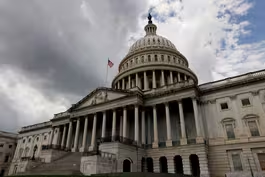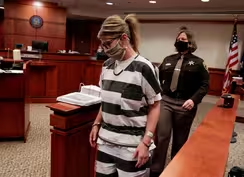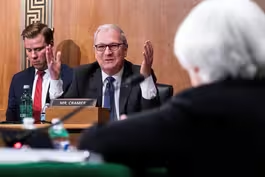
'Medgar and Myrlie' traces lives of civil rights leaders
Clip: 2/6/2024 | 10m 6sVideo has Closed Captions
Joy Reid's 'Medgar and Myrlie' traces extraordinary lives and love of civil rights leaders
A love story is helping paint a fuller picture of the civil rights movement. Activist Medgar Evers was killed in 1963 by a white supremacist outside his home in Mississippi. His murder thrust Myrlie Evers into the spotlight, becoming a freedom fighter in her own right. Joy-Ann Reid traces their extraordinary lives in “Medgar and Myrlie: Medgar Evers and the Love Story That Awakened America.”
Problems playing video? | Closed Captioning Feedback
Problems playing video? | Closed Captioning Feedback
Major corporate funding for the PBS News Hour is provided by BDO, BNSF, Consumer Cellular, American Cruise Lines, and Raymond James. Funding for the PBS NewsHour Weekend is provided by...

'Medgar and Myrlie' traces lives of civil rights leaders
Clip: 2/6/2024 | 10m 6sVideo has Closed Captions
A love story is helping paint a fuller picture of the civil rights movement. Activist Medgar Evers was killed in 1963 by a white supremacist outside his home in Mississippi. His murder thrust Myrlie Evers into the spotlight, becoming a freedom fighter in her own right. Joy-Ann Reid traces their extraordinary lives in “Medgar and Myrlie: Medgar Evers and the Love Story That Awakened America.”
Problems playing video? | Closed Captioning Feedback
How to Watch PBS News Hour
PBS News Hour is available to stream on pbs.org and the free PBS App, available on iPhone, Apple TV, Android TV, Android smartphones, Amazon Fire TV, Amazon Fire Tablet, Roku, Samsung Smart TV, and Vizio.
Providing Support for PBS.org
Learn Moreabout PBS online sponsorshipcivil rights movement, that# of Medgar and Myrlie Evers.
On June 12, 1963, Medgar Evers, a pioneering# civil rights activist, was su premacist outside his home in Jackson,# Mississippi.
His murder thrust his wife,## Myrlie Evers, into the national spotlight,# becoming a freedom fighter in her own right.
I spoke with author and MSNBC host Joy-Ann# Reid, who traces their extraordinary lives in## her new book out today, "Medgar and Myrlie: Medgar# Evers and the Love Story That Awakened America."
Joy Reid, welcome to the "NewsHour."
JOY-ANN REID, Author, "Medgar an GEOFF BENNETT: Of course.
So, Myrl first day of college at Alcorn# State.
What drew them together?
JOY-ANN REID: You know, it was in one sense# just his approach.
He was very aggressive.# He ran up to her as she was leaning sort# of against an electric pole, and he said:## "Hey, you're going to get shocked.# You need to walk away from that."
And she's like: "Well, I actually didn't need# tr ying to be haughty because she was raised# in Vicks a certain way toward men.
So it was partly# his approach.
There were a lot of guys who# were sizing up the young women, but he just# was different.
There was something about hi He was older 7 years older than her.# She didn't know exactly how much older,## but he just had sort of an air about# him.
And I think it was because he was## a World War II veteran and a football# player.
Each of those things things that her grandmother and her aunt# told her to absolutely stay away from.
So, in some sense, I think it was also the danger.
GEOFF BENNETT: And you use their# relationship as a lens through# which to explore the fight for justice,# equality, the civil rights mo JOY-ANN REID: Yes.
JOY-ANN REID: You know, what's interesting is,# I think that when we think le aders, we tend to think of them as sort of# just icons in is But what these were, were young men, very young# men in their 20s and 30s.
None of those sort of## greats that we think of in the civil rights# movement even lived to be 40.
And they lived## whole lives that included falling in love,# having children, being parents, being spouses.
And so what I wanted to do was to fill in the# narrative about the civil rights movement to put## it in the context of the two kinds of love that# it took, right?
You needed to have the loving## family that would support you and allow you to do# the thing that could get you all killed, a wife## that was willing to live in a house that could be# firebombed, then knew how to train your children## to understand that their father could die, that# their mother could die, that they could die.
GEOFF BENNETT: As field secretary for# the NAACP, that made him a target of## white racists who at the time terrorized# Black people in Mississippi with impunity.
And after his tragic death, his assassination,## Myrlie Evers committed herself to the fight.
I# mean, she became a She wrote a book about Medgar Evers.
She ran# for Congress.
She ultimately led the NAACP.
Tell me more about her second act.
JOY-ANN REID: You know, Myrlie Evers was,# ri ghts leaders.
She had no desire to# do this.
She just wanted to be with## her man.
She was a literal 1950s housewife# and just wanted her man to come home eve day and help her raise their children and# go to the movies and enjoy their romance.
But that was not in the cards# for her.
When Medgar died,## she was in her early 30s.
She was a very# young woman who has three chil but she was also angry.
And one of the things that# really struck me as I interviewe Myrlie Evers is,## she still can -- she can still# access that sense of palpable rage.
She wasn't just sad that Medgar was# dead.
She was angry.
And she channeled## that anger into the movement.
She was# determined to make sure his killer,## who was tried twice, to hung juries in the# 1960s, in '63 and '64, she wanted to see## him imprisoned for the rest of his life.
She# eventually got that.
It took her 30 years.
But she also wanted to see the NAACP live up to# its true aims, which they had had a fight Medgar about what he was doing.
They didn't agree# with direct action.
He did.
And she wanted to## right that ship as well, because she believed that# the NAACP had in many ways failed her husband.
And so her goal when he died was to right all of## the wrongs that she believed# took her husband from her.
GEOFF BENNETT: You know, Joy, one of# the reasons I'm so happy this book## exists is because so much of their# story and overlooked by history.
Is that# what drew you to this project?
JOY-ANN REID: Absolutely.
James Baldwin called the civil rights movement.
But people# know so much more about the other two## than they do about Medgar Evers.
He's# sort of a -- when you land in Jackson,## Mississippi, you land in Medgar Evers# Airport.
A lot of people don't know If you're in Brooklyn, you can go to Medgar# Evers College.
A lot of people know who that is.
They maybe have heard of the# name, but they really don't know his sto And to my mind, he was in many ways the most# heroic civil rights leader in this country,## because he was operating in the most# difficult state to do civil rights.
And## that was Mississippi, the most lynchings per# capita, the most aggressive Klan organization## that killed Goodman, Schwerner, and Chaney, and# many, many more, the most aggressive statewide## apparatus that was sort of the Klan in suits, a# literal spy organization that operated out of the## governor's office and the state legislature# to spy on the citizens of Mississippi.
That existed nowhere but that state.
And he was# not just the field secretary.
He was the first,## the inaugural field secretary.
And I can# remember Vernon Jordan, the wonderful,## great Vernon Jordan.
I interviewed him for# my first book, for "Fracture," and I reme sitting in his office and him saying to me that# he could remember -- he was very close to Medgar.
And he said he could remember# being on the phone with Medgar,## and Medgar literally crying and sayi They're terrified here.
People in the Delta are# so scared.
They don't want to put their names on## an NAACP ledger.
And my bosses want me to do# this, and they're insisting that's all I do,## sign people up for membership in# the NAACP and register them to vote.
But they don't understand.
They're in New# York.
And this is almost impossible here,## because these people need to develop just# the courage to walk into a department store.## It's so terrifying that just talking to a white# person in the wrong way can get you lynched here.
And I think, for a lot of people, they have# forgotten how much bravery it took for him to## operate, not in Georgia, not even in Louisiana,# not even in South Carolina, but Mississippi.
GEOFF BENNETT: What would the civil rights# movement have been without the influence,## example, and sacrifice of Myrlie# Evers-Williams and Medgar Evers?
JOY-ANN REID: I actually think it# would have been completely different.
Number one, you have to remember that# th e Voting Rights Act, it rolled through# Mississippi.
The most violent sit-in at a## Woolworths at a lunch counter in the United# States was at the Jackson Woolworths.
This## was the famous one where not only# was, like, flour and sugar dumped on## this integrated group of people that were# trying to desegregate that lunch counter They were beaten.
They were beaten# and bloodied and left on the ground,## and it became an international story.
And# that provoked -- it was one of the things## that provoked the Kennedy administration# to say, enough is enough.
The violence## that went through the University of# Mississippi when it was desegregated## was unlike anything the country had ever# seen, and they saw it on the ni And so the incidents that took place in# Mississippi, combined with the Alabama stand at## the schoolhouse door, were the sort of final, last# straw for the Kennedy administra ion, and Kennedy,## who had been a very reluctant friend of the civil# rights movement, because he needed Southern votes.
Remember, back then, these Southern states were# still swing states.
He had been very relucta He really wanted to do a big tax cut.
That was his# thing.
He finally said, nope, I'm going to do it.
And the thing that I think people don't# know, because they don't know Medgar,## is that he used some of Medgar's language# when he did that speech.
They they were World War II veterans.
He understood# the heroism and sacrifice of a an d he was moved by that veteran's status.
And when he promised to do that bill, when Medgar## was assassinated within hours after him# giving this historic televis the person that he gave the first draft of that# bill, the physical draft, was Myrlie Evers.
GEOFF BENNETT: Really?
with her children, still a grieving widow,# and the president gave her a copy of that## bill.
And he promised her that he would# do -- he would get that bill through.
And when that bill started to languish and take# a long time, the March on Washington in August## was to push him to get back on track and get that# bill done.
And Dr. King talked about Medgar Evers## and Emmett Till as two of the inspirations for# that march.
And there's two of the people that## he talked about the -- probably the most# when he would talk about the sacrifices.
His original version of the speech# that he gave on August 28, 1963,## he actually gave in Detroit.
And there# was a line that got cut out of the final## speech that said that, one of these --# one day in the future, we will come to## a day when the sacrifices of Emmett Till# and Medgar Evers wouldn't have to be made.
That was the first version of "I Have a# Dream."
That was the dream he spoke of.## It was ultimately cut out of the speech,# but Medgar Evers was on his mind at the## march.
And Myrlie Evers was the only# woman initially invited to speak along## with the big six.
She just wasn't able to# be there because of another commitment.
But Medgar Evers is infused in the civil# rights movement.
And his contemporaries## knew it.
It's just that, today, he's# sort of fallen out of the public memory.
GEOFF BENNETT: Well, this book# will certainly help change that,## "Medgar and Myrlie and the Love# St Joy-Ann Reid, always a pleasure to speak with you.
JOY-ANN REID: Geoff, thank you.
GEOFF BENNETT: Online right now, hear# fr iendship that Myrlie Evers-Williams# shared with the late Coretta and Betty Shabazz.
You can find it on# our YouTube and Instagram accounts.
Boeing under pressure amid safety and quality control issues
Video has Closed Captions
Clip: 2/6/2024 | 7m 20s | Boeing under pressure amid string of safety and quality control issues (7m 20s)
Border deal hits wall as GOP says they will block bill
Video has Closed Captions
Clip: 2/6/2024 | 4m 7s | Bipartisan border deal hits legislative wall as Republicans say they will block bill (4m 7s)
Mother of Michigan school shooter convicted of manslaughter
Video has Closed Captions
Clip: 2/6/2024 | 6m 8s | Mother of Michigan school shooter convicted of manslaughter in unprecedented case (6m 8s)
Sen. Cramer on why Republicans are blocking border bill
Video has Closed Captions
Clip: 2/6/2024 | 7m 13s | Sen. Cramer on why he and other Republicans aren't supporting the border deal (7m 13s)
Syria faces slow recovery a year after earthquake
Video has Closed Captions
Clip: 2/6/2024 | 8m 29s | Survivors face slow recovery in northwestern Syria a year after devastating earthquake (8m 29s)
Trump denied presidential immunity, court rules
Video has Closed Captions
Clip: 2/6/2024 | 4m 22s | Trump denied presidential immunity in election interference case, court rules (4m 22s)
Providing Support for PBS.org
Learn Moreabout PBS online sponsorship
- News and Public Affairs

FRONTLINE is investigative journalism that questions, explains and changes our world.

- News and Public Affairs

Amanpour and Company features conversations with leaders and decision makers.












Support for PBS provided by:
Major corporate funding for the PBS News Hour is provided by BDO, BNSF, Consumer Cellular, American Cruise Lines, and Raymond James. Funding for the PBS NewsHour Weekend is provided by...





